Sustainability Report: Coles Group Business Operations Analysis
VerifiedAdded on 2022/10/04
|10
|2624
|13
Report
AI Summary
This report provides a comprehensive analysis of Coles Group's sustainability initiatives, examining their business operations, current policies, and management strategies in relation to climate change and environmental sustainability. It delves into the organization's structure, product offerings, and financial performance, highlighting its commitment to waste reduction, recycling programs, and ethical sourcing. The report includes a SWOT analysis to evaluate Coles' strengths, weaknesses, opportunities, and threats, particularly concerning its sustainability efforts. Furthermore, it proposes a plan for improving the company's policies and strategies to minimize the impacts of climate change on its business operations and enhance its competitive advantage. The report covers various aspects of Coles' sustainability journey, including its approach to energy efficiency, packaging, and community engagement, providing a detailed overview of its environmental and social responsibility.
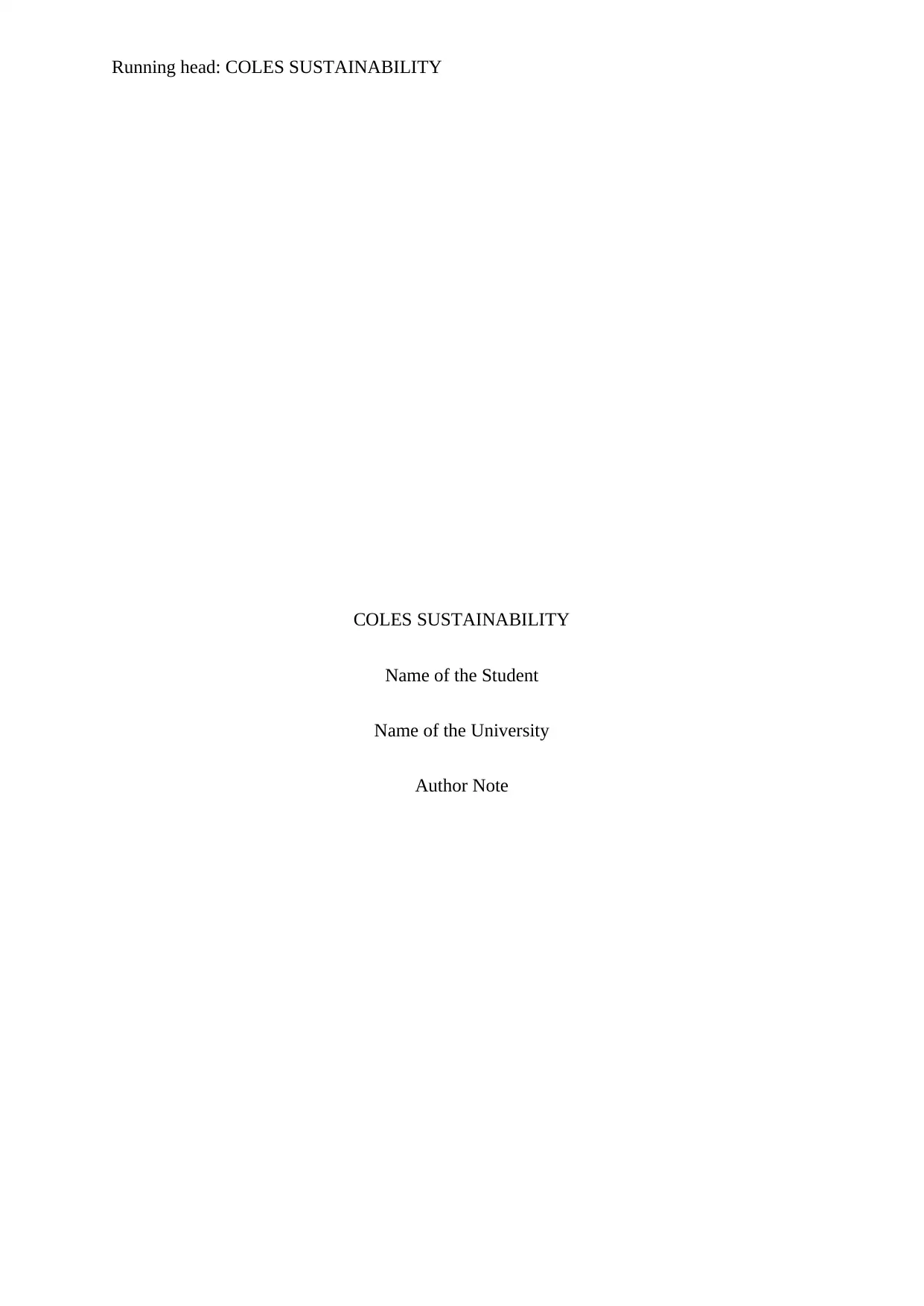
Running head: COLES SUSTAINABILITY
COLES SUSTAINABILITY
Name of the Student
Name of the University
Author Note
COLES SUSTAINABILITY
Name of the Student
Name of the University
Author Note
Paraphrase This Document
Need a fresh take? Get an instant paraphrase of this document with our AI Paraphraser
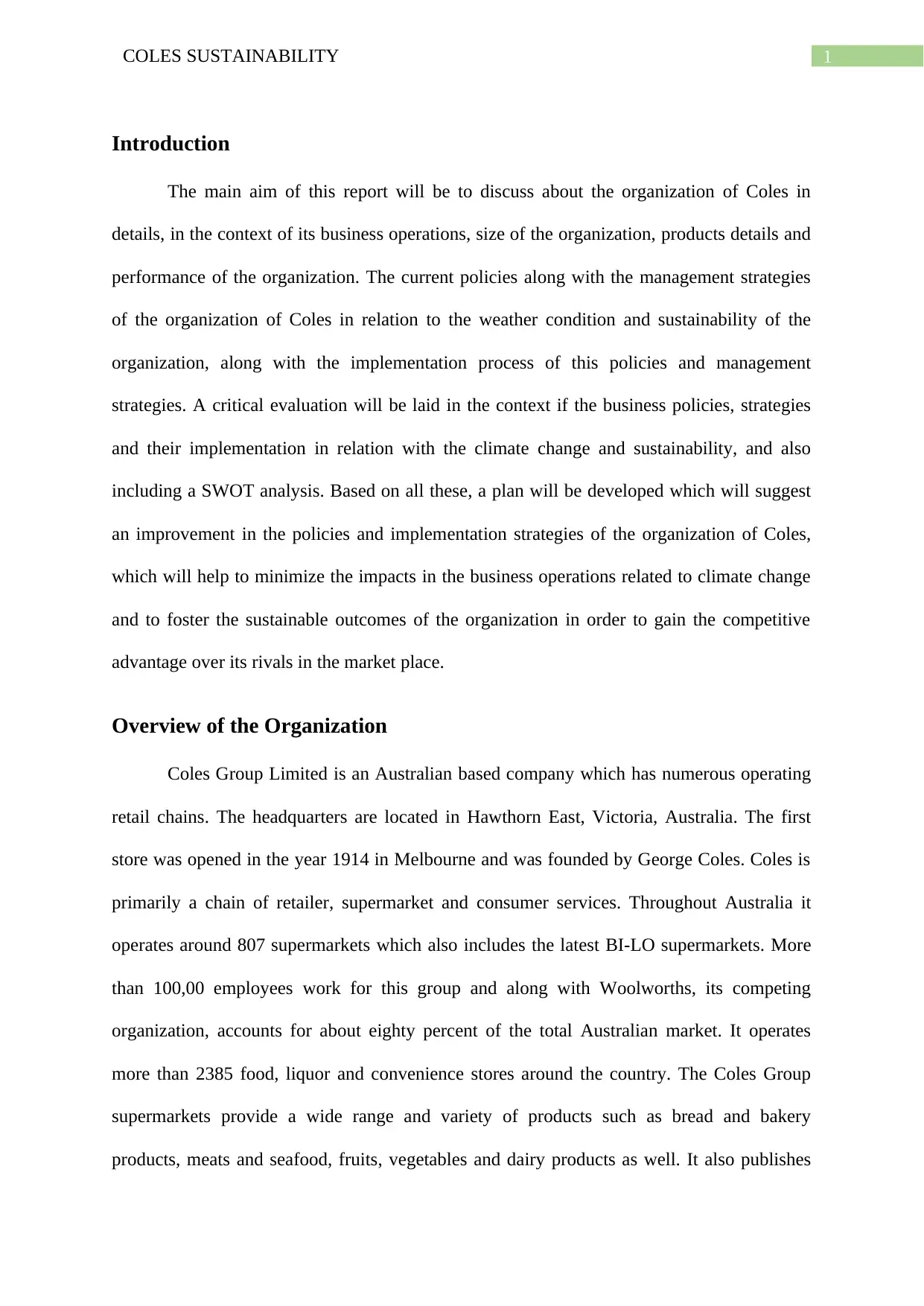
1COLES SUSTAINABILITY
Introduction
The main aim of this report will be to discuss about the organization of Coles in
details, in the context of its business operations, size of the organization, products details and
performance of the organization. The current policies along with the management strategies
of the organization of Coles in relation to the weather condition and sustainability of the
organization, along with the implementation process of this policies and management
strategies. A critical evaluation will be laid in the context if the business policies, strategies
and their implementation in relation with the climate change and sustainability, and also
including a SWOT analysis. Based on all these, a plan will be developed which will suggest
an improvement in the policies and implementation strategies of the organization of Coles,
which will help to minimize the impacts in the business operations related to climate change
and to foster the sustainable outcomes of the organization in order to gain the competitive
advantage over its rivals in the market place.
Overview of the Organization
Coles Group Limited is an Australian based company which has numerous operating
retail chains. The headquarters are located in Hawthorn East, Victoria, Australia. The first
store was opened in the year 1914 in Melbourne and was founded by George Coles. Coles is
primarily a chain of retailer, supermarket and consumer services. Throughout Australia it
operates around 807 supermarkets which also includes the latest BI-LO supermarkets. More
than 100,00 employees work for this group and along with Woolworths, its competing
organization, accounts for about eighty percent of the total Australian market. It operates
more than 2385 food, liquor and convenience stores around the country. The Coles Group
supermarkets provide a wide range and variety of products such as bread and bakery
products, meats and seafood, fruits, vegetables and dairy products as well. It also publishes
Introduction
The main aim of this report will be to discuss about the organization of Coles in
details, in the context of its business operations, size of the organization, products details and
performance of the organization. The current policies along with the management strategies
of the organization of Coles in relation to the weather condition and sustainability of the
organization, along with the implementation process of this policies and management
strategies. A critical evaluation will be laid in the context if the business policies, strategies
and their implementation in relation with the climate change and sustainability, and also
including a SWOT analysis. Based on all these, a plan will be developed which will suggest
an improvement in the policies and implementation strategies of the organization of Coles,
which will help to minimize the impacts in the business operations related to climate change
and to foster the sustainable outcomes of the organization in order to gain the competitive
advantage over its rivals in the market place.
Overview of the Organization
Coles Group Limited is an Australian based company which has numerous operating
retail chains. The headquarters are located in Hawthorn East, Victoria, Australia. The first
store was opened in the year 1914 in Melbourne and was founded by George Coles. Coles is
primarily a chain of retailer, supermarket and consumer services. Throughout Australia it
operates around 807 supermarkets which also includes the latest BI-LO supermarkets. More
than 100,00 employees work for this group and along with Woolworths, its competing
organization, accounts for about eighty percent of the total Australian market. It operates
more than 2385 food, liquor and convenience stores around the country. The Coles Group
supermarkets provide a wide range and variety of products such as bread and bakery
products, meats and seafood, fruits, vegetables and dairy products as well. It also publishes
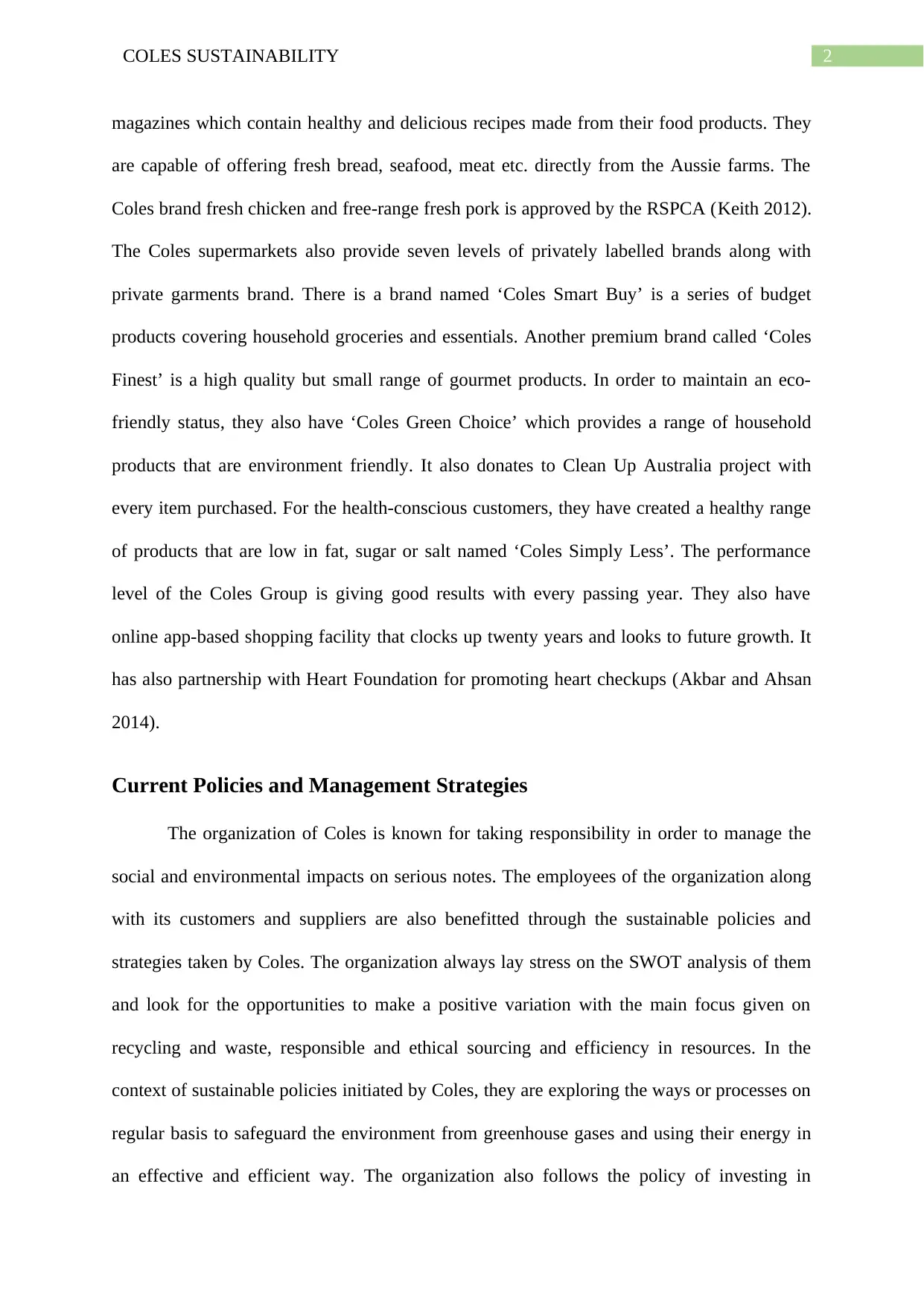
2COLES SUSTAINABILITY
magazines which contain healthy and delicious recipes made from their food products. They
are capable of offering fresh bread, seafood, meat etc. directly from the Aussie farms. The
Coles brand fresh chicken and free-range fresh pork is approved by the RSPCA (Keith 2012).
The Coles supermarkets also provide seven levels of privately labelled brands along with
private garments brand. There is a brand named ‘Coles Smart Buy’ is a series of budget
products covering household groceries and essentials. Another premium brand called ‘Coles
Finest’ is a high quality but small range of gourmet products. In order to maintain an eco-
friendly status, they also have ‘Coles Green Choice’ which provides a range of household
products that are environment friendly. It also donates to Clean Up Australia project with
every item purchased. For the health-conscious customers, they have created a healthy range
of products that are low in fat, sugar or salt named ‘Coles Simply Less’. The performance
level of the Coles Group is giving good results with every passing year. They also have
online app-based shopping facility that clocks up twenty years and looks to future growth. It
has also partnership with Heart Foundation for promoting heart checkups (Akbar and Ahsan
2014).
Current Policies and Management Strategies
The organization of Coles is known for taking responsibility in order to manage the
social and environmental impacts on serious notes. The employees of the organization along
with its customers and suppliers are also benefitted through the sustainable policies and
strategies taken by Coles. The organization always lay stress on the SWOT analysis of them
and look for the opportunities to make a positive variation with the main focus given on
recycling and waste, responsible and ethical sourcing and efficiency in resources. In the
context of sustainable policies initiated by Coles, they are exploring the ways or processes on
regular basis to safeguard the environment from greenhouse gases and using their energy in
an effective and efficient way. The organization also follows the policy of investing in
magazines which contain healthy and delicious recipes made from their food products. They
are capable of offering fresh bread, seafood, meat etc. directly from the Aussie farms. The
Coles brand fresh chicken and free-range fresh pork is approved by the RSPCA (Keith 2012).
The Coles supermarkets also provide seven levels of privately labelled brands along with
private garments brand. There is a brand named ‘Coles Smart Buy’ is a series of budget
products covering household groceries and essentials. Another premium brand called ‘Coles
Finest’ is a high quality but small range of gourmet products. In order to maintain an eco-
friendly status, they also have ‘Coles Green Choice’ which provides a range of household
products that are environment friendly. It also donates to Clean Up Australia project with
every item purchased. For the health-conscious customers, they have created a healthy range
of products that are low in fat, sugar or salt named ‘Coles Simply Less’. The performance
level of the Coles Group is giving good results with every passing year. They also have
online app-based shopping facility that clocks up twenty years and looks to future growth. It
has also partnership with Heart Foundation for promoting heart checkups (Akbar and Ahsan
2014).
Current Policies and Management Strategies
The organization of Coles is known for taking responsibility in order to manage the
social and environmental impacts on serious notes. The employees of the organization along
with its customers and suppliers are also benefitted through the sustainable policies and
strategies taken by Coles. The organization always lay stress on the SWOT analysis of them
and look for the opportunities to make a positive variation with the main focus given on
recycling and waste, responsible and ethical sourcing and efficiency in resources. In the
context of sustainable policies initiated by Coles, they are exploring the ways or processes on
regular basis to safeguard the environment from greenhouse gases and using their energy in
an effective and efficient way. The organization also follows the policy of investing in
⊘ This is a preview!⊘
Do you want full access?
Subscribe today to unlock all pages.

Trusted by 1+ million students worldwide
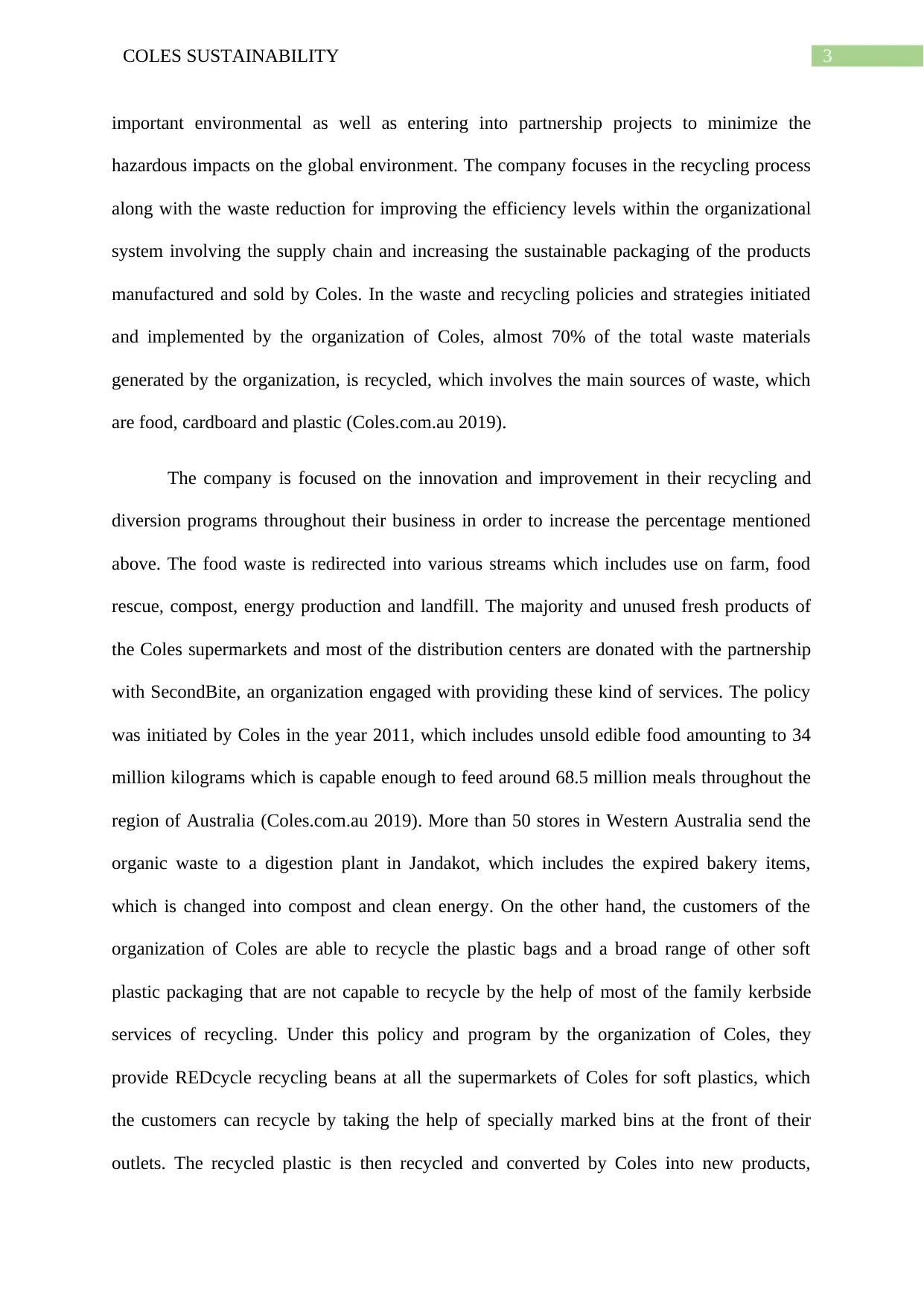
3COLES SUSTAINABILITY
important environmental as well as entering into partnership projects to minimize the
hazardous impacts on the global environment. The company focuses in the recycling process
along with the waste reduction for improving the efficiency levels within the organizational
system involving the supply chain and increasing the sustainable packaging of the products
manufactured and sold by Coles. In the waste and recycling policies and strategies initiated
and implemented by the organization of Coles, almost 70% of the total waste materials
generated by the organization, is recycled, which involves the main sources of waste, which
are food, cardboard and plastic (Coles.com.au 2019).
The company is focused on the innovation and improvement in their recycling and
diversion programs throughout their business in order to increase the percentage mentioned
above. The food waste is redirected into various streams which includes use on farm, food
rescue, compost, energy production and landfill. The majority and unused fresh products of
the Coles supermarkets and most of the distribution centers are donated with the partnership
with SecondBite, an organization engaged with providing these kind of services. The policy
was initiated by Coles in the year 2011, which includes unsold edible food amounting to 34
million kilograms which is capable enough to feed around 68.5 million meals throughout the
region of Australia (Coles.com.au 2019). More than 50 stores in Western Australia send the
organic waste to a digestion plant in Jandakot, which includes the expired bakery items,
which is changed into compost and clean energy. On the other hand, the customers of the
organization of Coles are able to recycle the plastic bags and a broad range of other soft
plastic packaging that are not capable to recycle by the help of most of the family kerbside
services of recycling. Under this policy and program by the organization of Coles, they
provide REDcycle recycling beans at all the supermarkets of Coles for soft plastics, which
the customers can recycle by taking the help of specially marked bins at the front of their
outlets. The recycled plastic is then recycled and converted by Coles into new products,
important environmental as well as entering into partnership projects to minimize the
hazardous impacts on the global environment. The company focuses in the recycling process
along with the waste reduction for improving the efficiency levels within the organizational
system involving the supply chain and increasing the sustainable packaging of the products
manufactured and sold by Coles. In the waste and recycling policies and strategies initiated
and implemented by the organization of Coles, almost 70% of the total waste materials
generated by the organization, is recycled, which involves the main sources of waste, which
are food, cardboard and plastic (Coles.com.au 2019).
The company is focused on the innovation and improvement in their recycling and
diversion programs throughout their business in order to increase the percentage mentioned
above. The food waste is redirected into various streams which includes use on farm, food
rescue, compost, energy production and landfill. The majority and unused fresh products of
the Coles supermarkets and most of the distribution centers are donated with the partnership
with SecondBite, an organization engaged with providing these kind of services. The policy
was initiated by Coles in the year 2011, which includes unsold edible food amounting to 34
million kilograms which is capable enough to feed around 68.5 million meals throughout the
region of Australia (Coles.com.au 2019). More than 50 stores in Western Australia send the
organic waste to a digestion plant in Jandakot, which includes the expired bakery items,
which is changed into compost and clean energy. On the other hand, the customers of the
organization of Coles are able to recycle the plastic bags and a broad range of other soft
plastic packaging that are not capable to recycle by the help of most of the family kerbside
services of recycling. Under this policy and program by the organization of Coles, they
provide REDcycle recycling beans at all the supermarkets of Coles for soft plastics, which
the customers can recycle by taking the help of specially marked bins at the front of their
outlets. The recycled plastic is then recycled and converted by Coles into new products,
Paraphrase This Document
Need a fresh take? Get an instant paraphrase of this document with our AI Paraphraser
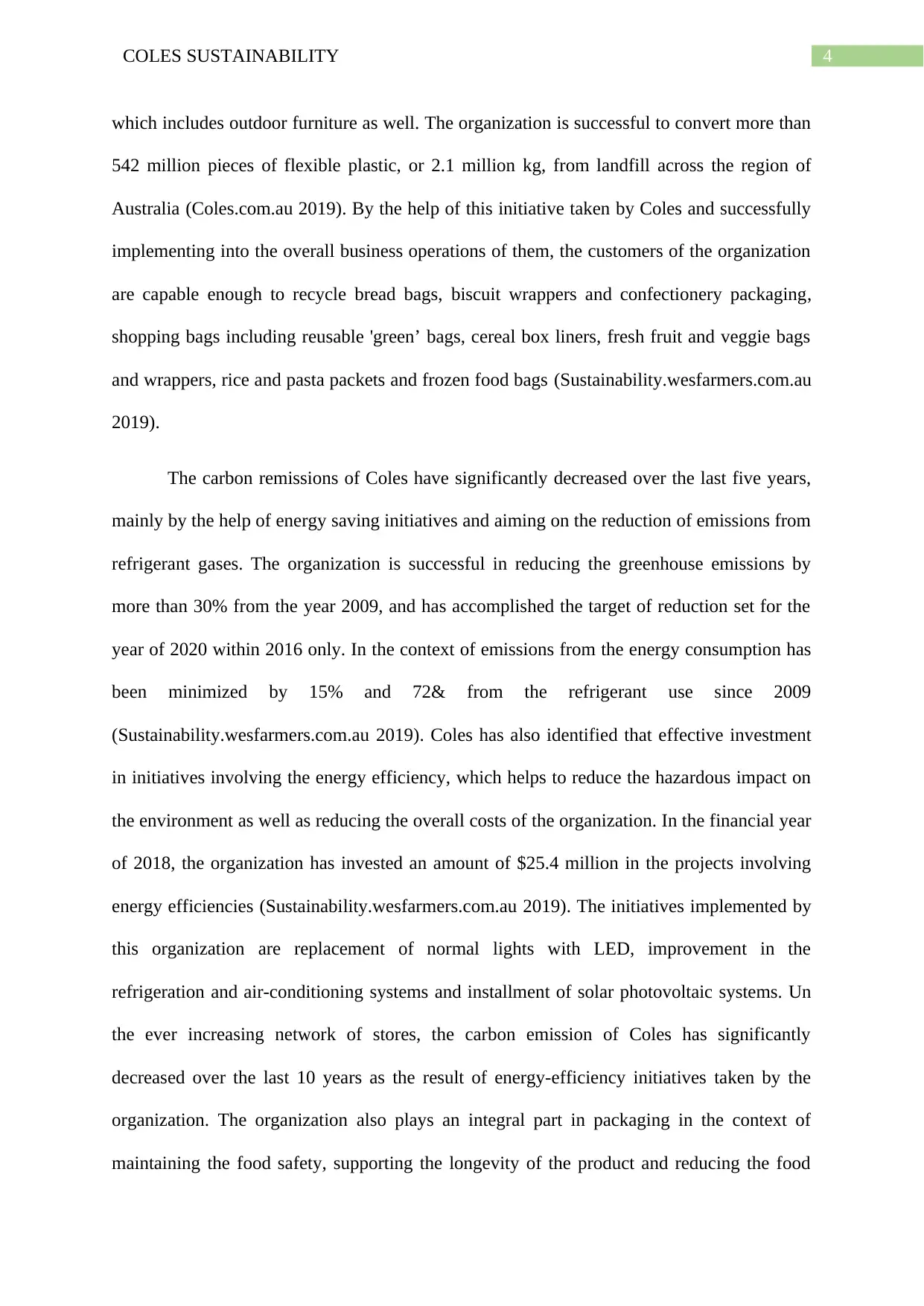
4COLES SUSTAINABILITY
which includes outdoor furniture as well. The organization is successful to convert more than
542 million pieces of flexible plastic, or 2.1 million kg, from landfill across the region of
Australia (Coles.com.au 2019). By the help of this initiative taken by Coles and successfully
implementing into the overall business operations of them, the customers of the organization
are capable enough to recycle bread bags, biscuit wrappers and confectionery packaging,
shopping bags including reusable 'green’ bags, cereal box liners, fresh fruit and veggie bags
and wrappers, rice and pasta packets and frozen food bags (Sustainability.wesfarmers.com.au
2019).
The carbon remissions of Coles have significantly decreased over the last five years,
mainly by the help of energy saving initiatives and aiming on the reduction of emissions from
refrigerant gases. The organization is successful in reducing the greenhouse emissions by
more than 30% from the year 2009, and has accomplished the target of reduction set for the
year of 2020 within 2016 only. In the context of emissions from the energy consumption has
been minimized by 15% and 72& from the refrigerant use since 2009
(Sustainability.wesfarmers.com.au 2019). Coles has also identified that effective investment
in initiatives involving the energy efficiency, which helps to reduce the hazardous impact on
the environment as well as reducing the overall costs of the organization. In the financial year
of 2018, the organization has invested an amount of $25.4 million in the projects involving
energy efficiencies (Sustainability.wesfarmers.com.au 2019). The initiatives implemented by
this organization are replacement of normal lights with LED, improvement in the
refrigeration and air-conditioning systems and installment of solar photovoltaic systems. Un
the ever increasing network of stores, the carbon emission of Coles has significantly
decreased over the last 10 years as the result of energy-efficiency initiatives taken by the
organization. The organization also plays an integral part in packaging in the context of
maintaining the food safety, supporting the longevity of the product and reducing the food
which includes outdoor furniture as well. The organization is successful to convert more than
542 million pieces of flexible plastic, or 2.1 million kg, from landfill across the region of
Australia (Coles.com.au 2019). By the help of this initiative taken by Coles and successfully
implementing into the overall business operations of them, the customers of the organization
are capable enough to recycle bread bags, biscuit wrappers and confectionery packaging,
shopping bags including reusable 'green’ bags, cereal box liners, fresh fruit and veggie bags
and wrappers, rice and pasta packets and frozen food bags (Sustainability.wesfarmers.com.au
2019).
The carbon remissions of Coles have significantly decreased over the last five years,
mainly by the help of energy saving initiatives and aiming on the reduction of emissions from
refrigerant gases. The organization is successful in reducing the greenhouse emissions by
more than 30% from the year 2009, and has accomplished the target of reduction set for the
year of 2020 within 2016 only. In the context of emissions from the energy consumption has
been minimized by 15% and 72& from the refrigerant use since 2009
(Sustainability.wesfarmers.com.au 2019). Coles has also identified that effective investment
in initiatives involving the energy efficiency, which helps to reduce the hazardous impact on
the environment as well as reducing the overall costs of the organization. In the financial year
of 2018, the organization has invested an amount of $25.4 million in the projects involving
energy efficiencies (Sustainability.wesfarmers.com.au 2019). The initiatives implemented by
this organization are replacement of normal lights with LED, improvement in the
refrigeration and air-conditioning systems and installment of solar photovoltaic systems. Un
the ever increasing network of stores, the carbon emission of Coles has significantly
decreased over the last 10 years as the result of energy-efficiency initiatives taken by the
organization. The organization also plays an integral part in packaging in the context of
maintaining the food safety, supporting the longevity of the product and reducing the food
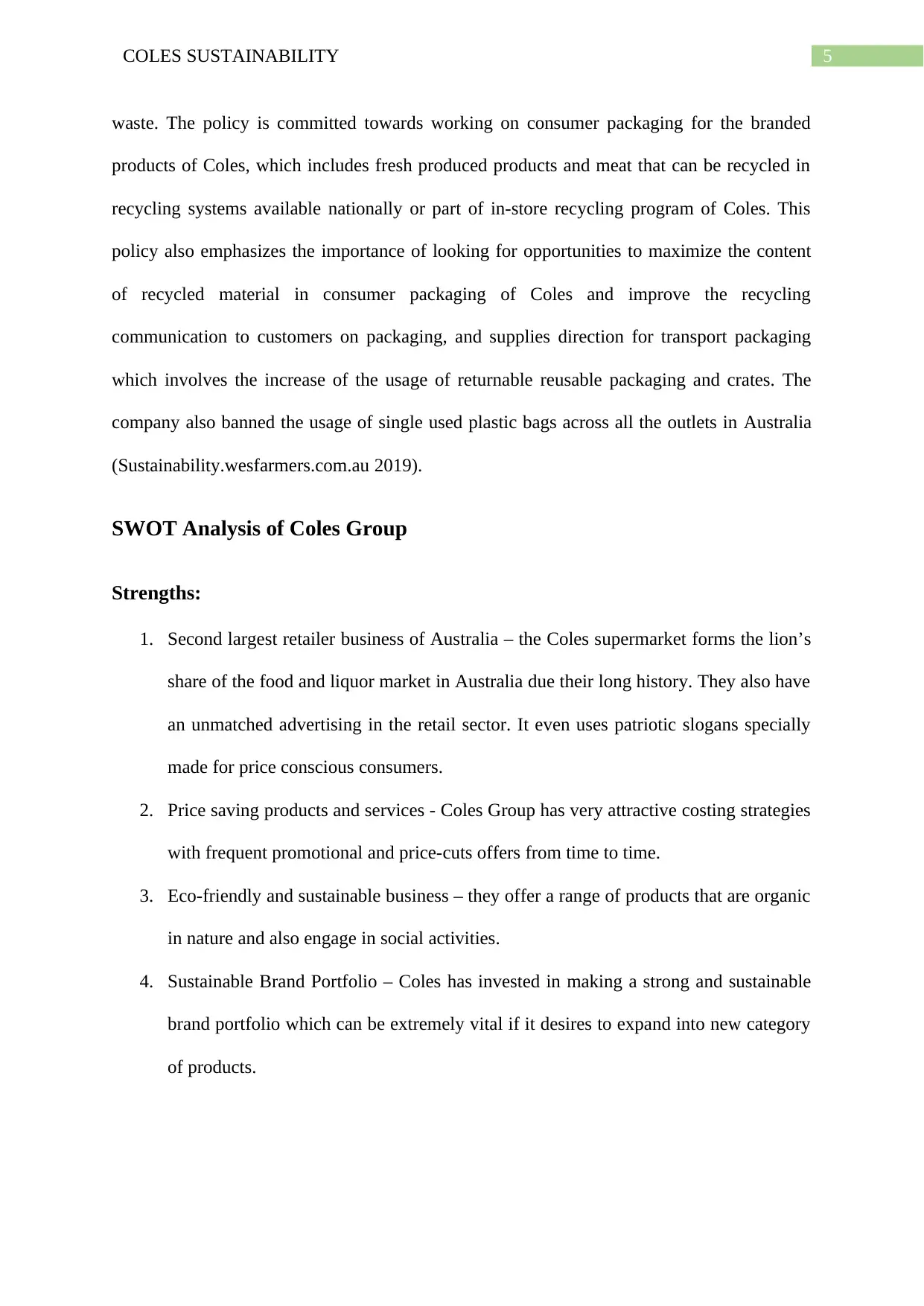
5COLES SUSTAINABILITY
waste. The policy is committed towards working on consumer packaging for the branded
products of Coles, which includes fresh produced products and meat that can be recycled in
recycling systems available nationally or part of in-store recycling program of Coles. This
policy also emphasizes the importance of looking for opportunities to maximize the content
of recycled material in consumer packaging of Coles and improve the recycling
communication to customers on packaging, and supplies direction for transport packaging
which involves the increase of the usage of returnable reusable packaging and crates. The
company also banned the usage of single used plastic bags across all the outlets in Australia
(Sustainability.wesfarmers.com.au 2019).
SWOT Analysis of Coles Group
Strengths:
1. Second largest retailer business of Australia – the Coles supermarket forms the lion’s
share of the food and liquor market in Australia due their long history. They also have
an unmatched advertising in the retail sector. It even uses patriotic slogans specially
made for price conscious consumers.
2. Price saving products and services - Coles Group has very attractive costing strategies
with frequent promotional and price-cuts offers from time to time.
3. Eco-friendly and sustainable business – they offer a range of products that are organic
in nature and also engage in social activities.
4. Sustainable Brand Portfolio – Coles has invested in making a strong and sustainable
brand portfolio which can be extremely vital if it desires to expand into new category
of products.
waste. The policy is committed towards working on consumer packaging for the branded
products of Coles, which includes fresh produced products and meat that can be recycled in
recycling systems available nationally or part of in-store recycling program of Coles. This
policy also emphasizes the importance of looking for opportunities to maximize the content
of recycled material in consumer packaging of Coles and improve the recycling
communication to customers on packaging, and supplies direction for transport packaging
which involves the increase of the usage of returnable reusable packaging and crates. The
company also banned the usage of single used plastic bags across all the outlets in Australia
(Sustainability.wesfarmers.com.au 2019).
SWOT Analysis of Coles Group
Strengths:
1. Second largest retailer business of Australia – the Coles supermarket forms the lion’s
share of the food and liquor market in Australia due their long history. They also have
an unmatched advertising in the retail sector. It even uses patriotic slogans specially
made for price conscious consumers.
2. Price saving products and services - Coles Group has very attractive costing strategies
with frequent promotional and price-cuts offers from time to time.
3. Eco-friendly and sustainable business – they offer a range of products that are organic
in nature and also engage in social activities.
4. Sustainable Brand Portfolio – Coles has invested in making a strong and sustainable
brand portfolio which can be extremely vital if it desires to expand into new category
of products.
⊘ This is a preview!⊘
Do you want full access?
Subscribe today to unlock all pages.

Trusted by 1+ million students worldwide
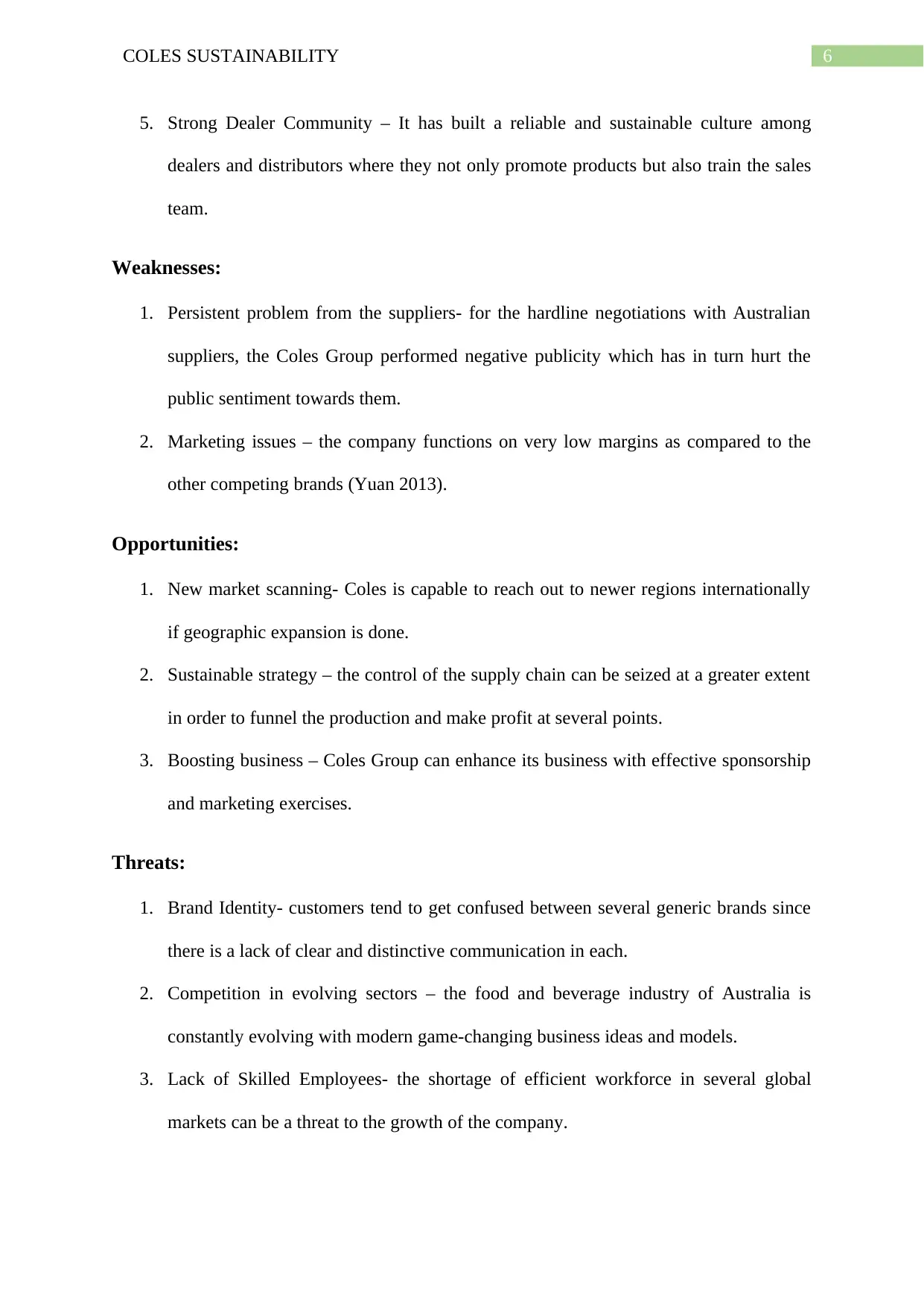
6COLES SUSTAINABILITY
5. Strong Dealer Community – It has built a reliable and sustainable culture among
dealers and distributors where they not only promote products but also train the sales
team.
Weaknesses:
1. Persistent problem from the suppliers- for the hardline negotiations with Australian
suppliers, the Coles Group performed negative publicity which has in turn hurt the
public sentiment towards them.
2. Marketing issues – the company functions on very low margins as compared to the
other competing brands (Yuan 2013).
Opportunities:
1. New market scanning- Coles is capable to reach out to newer regions internationally
if geographic expansion is done.
2. Sustainable strategy – the control of the supply chain can be seized at a greater extent
in order to funnel the production and make profit at several points.
3. Boosting business – Coles Group can enhance its business with effective sponsorship
and marketing exercises.
Threats:
1. Brand Identity- customers tend to get confused between several generic brands since
there is a lack of clear and distinctive communication in each.
2. Competition in evolving sectors – the food and beverage industry of Australia is
constantly evolving with modern game-changing business ideas and models.
3. Lack of Skilled Employees- the shortage of efficient workforce in several global
markets can be a threat to the growth of the company.
5. Strong Dealer Community – It has built a reliable and sustainable culture among
dealers and distributors where they not only promote products but also train the sales
team.
Weaknesses:
1. Persistent problem from the suppliers- for the hardline negotiations with Australian
suppliers, the Coles Group performed negative publicity which has in turn hurt the
public sentiment towards them.
2. Marketing issues – the company functions on very low margins as compared to the
other competing brands (Yuan 2013).
Opportunities:
1. New market scanning- Coles is capable to reach out to newer regions internationally
if geographic expansion is done.
2. Sustainable strategy – the control of the supply chain can be seized at a greater extent
in order to funnel the production and make profit at several points.
3. Boosting business – Coles Group can enhance its business with effective sponsorship
and marketing exercises.
Threats:
1. Brand Identity- customers tend to get confused between several generic brands since
there is a lack of clear and distinctive communication in each.
2. Competition in evolving sectors – the food and beverage industry of Australia is
constantly evolving with modern game-changing business ideas and models.
3. Lack of Skilled Employees- the shortage of efficient workforce in several global
markets can be a threat to the growth of the company.
Paraphrase This Document
Need a fresh take? Get an instant paraphrase of this document with our AI Paraphraser
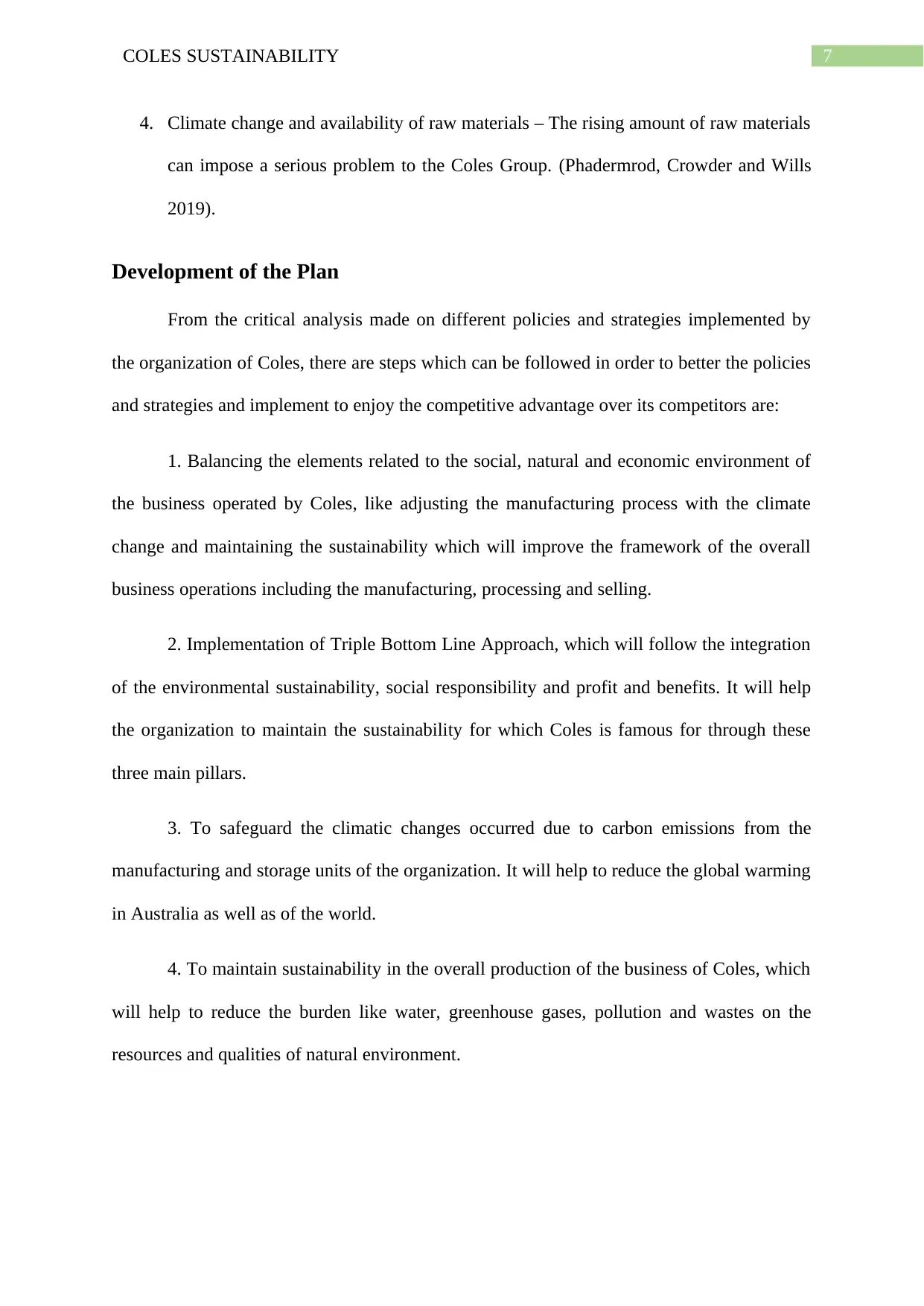
7COLES SUSTAINABILITY
4. Climate change and availability of raw materials – The rising amount of raw materials
can impose a serious problem to the Coles Group. (Phadermrod, Crowder and Wills
2019).
Development of the Plan
From the critical analysis made on different policies and strategies implemented by
the organization of Coles, there are steps which can be followed in order to better the policies
and strategies and implement to enjoy the competitive advantage over its competitors are:
1. Balancing the elements related to the social, natural and economic environment of
the business operated by Coles, like adjusting the manufacturing process with the climate
change and maintaining the sustainability which will improve the framework of the overall
business operations including the manufacturing, processing and selling.
2. Implementation of Triple Bottom Line Approach, which will follow the integration
of the environmental sustainability, social responsibility and profit and benefits. It will help
the organization to maintain the sustainability for which Coles is famous for through these
three main pillars.
3. To safeguard the climatic changes occurred due to carbon emissions from the
manufacturing and storage units of the organization. It will help to reduce the global warming
in Australia as well as of the world.
4. To maintain sustainability in the overall production of the business of Coles, which
will help to reduce the burden like water, greenhouse gases, pollution and wastes on the
resources and qualities of natural environment.
4. Climate change and availability of raw materials – The rising amount of raw materials
can impose a serious problem to the Coles Group. (Phadermrod, Crowder and Wills
2019).
Development of the Plan
From the critical analysis made on different policies and strategies implemented by
the organization of Coles, there are steps which can be followed in order to better the policies
and strategies and implement to enjoy the competitive advantage over its competitors are:
1. Balancing the elements related to the social, natural and economic environment of
the business operated by Coles, like adjusting the manufacturing process with the climate
change and maintaining the sustainability which will improve the framework of the overall
business operations including the manufacturing, processing and selling.
2. Implementation of Triple Bottom Line Approach, which will follow the integration
of the environmental sustainability, social responsibility and profit and benefits. It will help
the organization to maintain the sustainability for which Coles is famous for through these
three main pillars.
3. To safeguard the climatic changes occurred due to carbon emissions from the
manufacturing and storage units of the organization. It will help to reduce the global warming
in Australia as well as of the world.
4. To maintain sustainability in the overall production of the business of Coles, which
will help to reduce the burden like water, greenhouse gases, pollution and wastes on the
resources and qualities of natural environment.
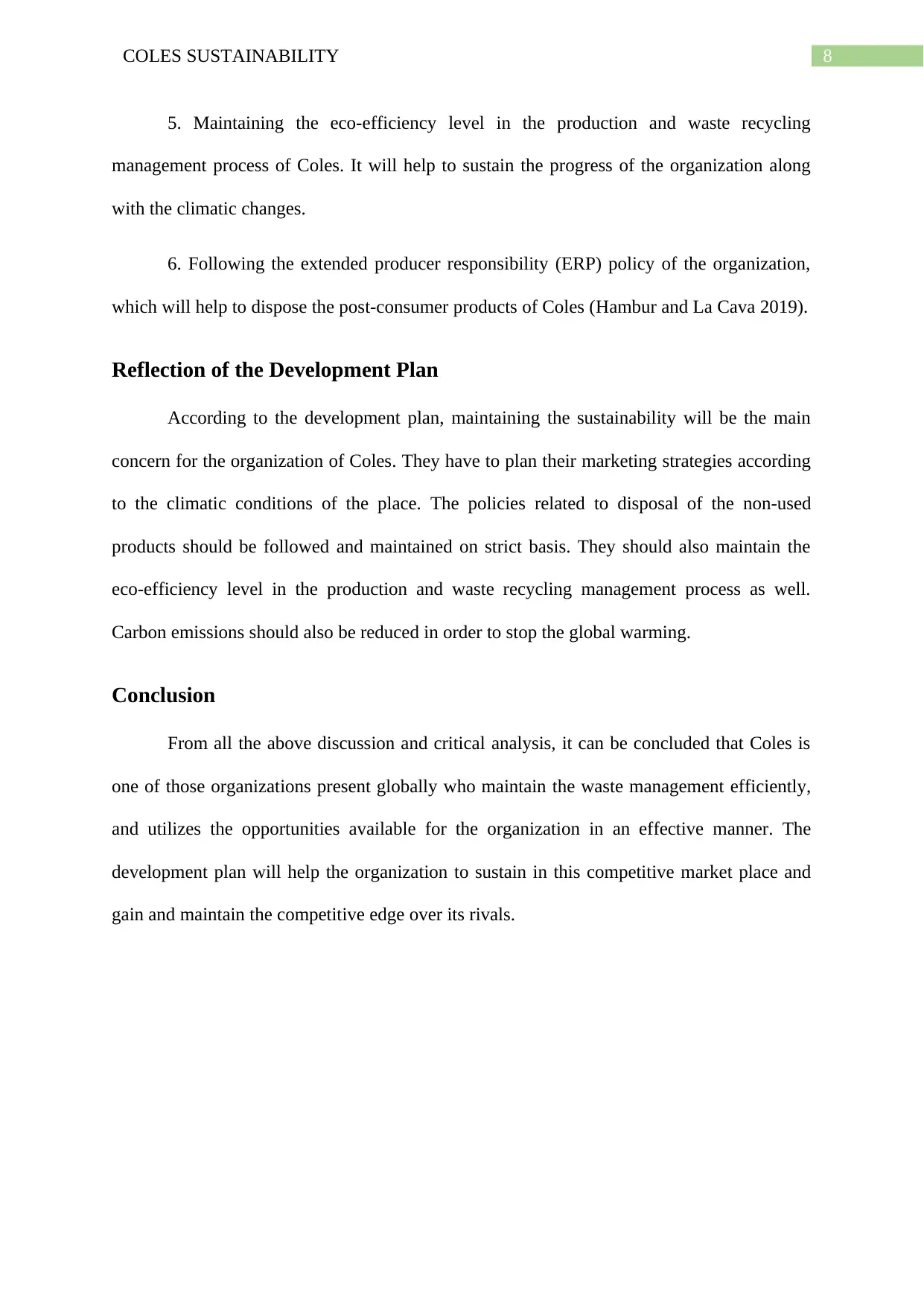
8COLES SUSTAINABILITY
5. Maintaining the eco-efficiency level in the production and waste recycling
management process of Coles. It will help to sustain the progress of the organization along
with the climatic changes.
6. Following the extended producer responsibility (ERP) policy of the organization,
which will help to dispose the post-consumer products of Coles (Hambur and La Cava 2019).
Reflection of the Development Plan
According to the development plan, maintaining the sustainability will be the main
concern for the organization of Coles. They have to plan their marketing strategies according
to the climatic conditions of the place. The policies related to disposal of the non-used
products should be followed and maintained on strict basis. They should also maintain the
eco-efficiency level in the production and waste recycling management process as well.
Carbon emissions should also be reduced in order to stop the global warming.
Conclusion
From all the above discussion and critical analysis, it can be concluded that Coles is
one of those organizations present globally who maintain the waste management efficiently,
and utilizes the opportunities available for the organization in an effective manner. The
development plan will help the organization to sustain in this competitive market place and
gain and maintain the competitive edge over its rivals.
5. Maintaining the eco-efficiency level in the production and waste recycling
management process of Coles. It will help to sustain the progress of the organization along
with the climatic changes.
6. Following the extended producer responsibility (ERP) policy of the organization,
which will help to dispose the post-consumer products of Coles (Hambur and La Cava 2019).
Reflection of the Development Plan
According to the development plan, maintaining the sustainability will be the main
concern for the organization of Coles. They have to plan their marketing strategies according
to the climatic conditions of the place. The policies related to disposal of the non-used
products should be followed and maintained on strict basis. They should also maintain the
eco-efficiency level in the production and waste recycling management process as well.
Carbon emissions should also be reduced in order to stop the global warming.
Conclusion
From all the above discussion and critical analysis, it can be concluded that Coles is
one of those organizations present globally who maintain the waste management efficiently,
and utilizes the opportunities available for the organization in an effective manner. The
development plan will help the organization to sustain in this competitive market place and
gain and maintain the competitive edge over its rivals.
⊘ This is a preview!⊘
Do you want full access?
Subscribe today to unlock all pages.

Trusted by 1+ million students worldwide
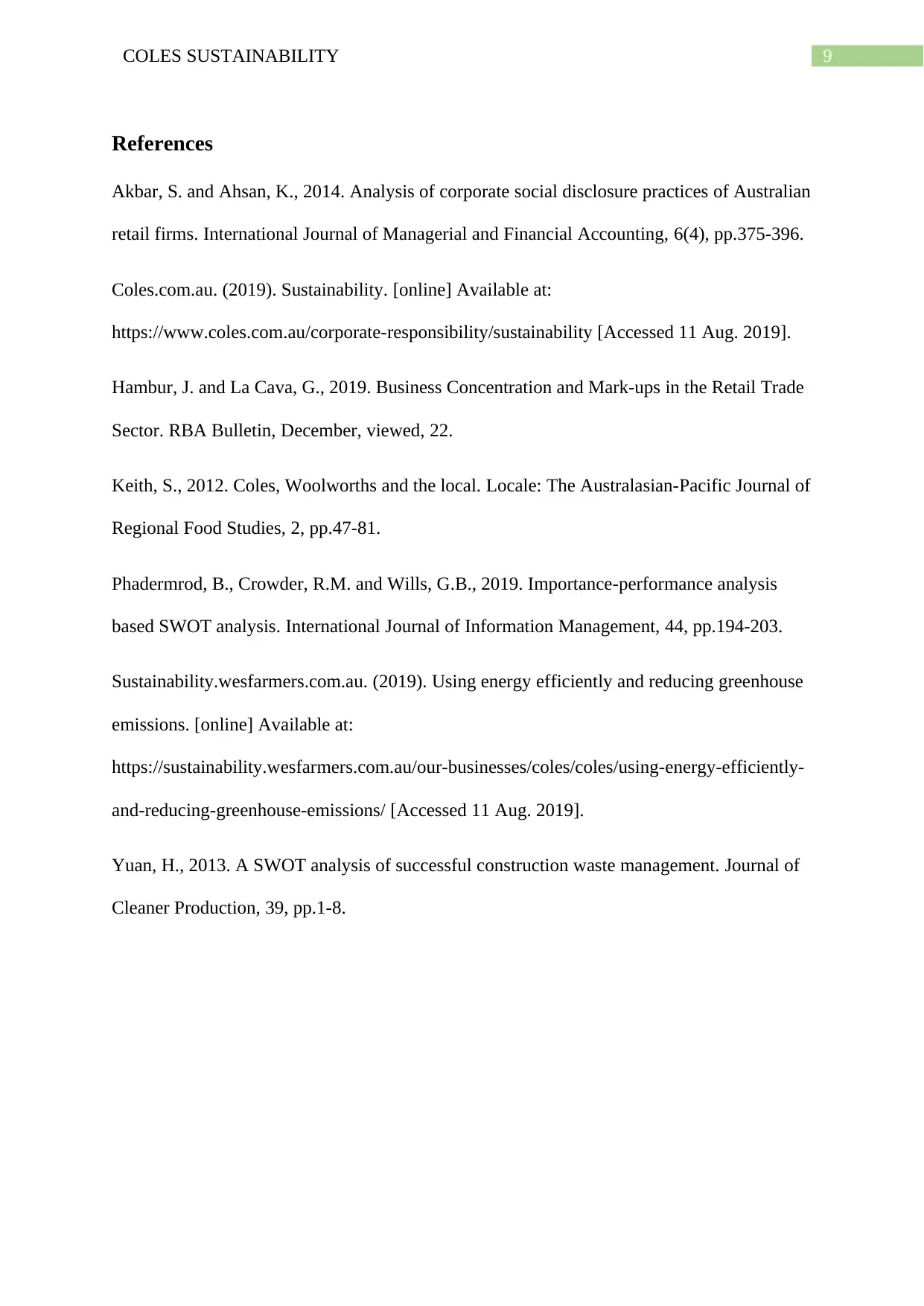
9COLES SUSTAINABILITY
References
Akbar, S. and Ahsan, K., 2014. Analysis of corporate social disclosure practices of Australian
retail firms. International Journal of Managerial and Financial Accounting, 6(4), pp.375-396.
Coles.com.au. (2019). Sustainability. [online] Available at:
https://www.coles.com.au/corporate-responsibility/sustainability [Accessed 11 Aug. 2019].
Hambur, J. and La Cava, G., 2019. Business Concentration and Mark-ups in the Retail Trade
Sector. RBA Bulletin, December, viewed, 22.
Keith, S., 2012. Coles, Woolworths and the local. Locale: The Australasian-Pacific Journal of
Regional Food Studies, 2, pp.47-81.
Phadermrod, B., Crowder, R.M. and Wills, G.B., 2019. Importance-performance analysis
based SWOT analysis. International Journal of Information Management, 44, pp.194-203.
Sustainability.wesfarmers.com.au. (2019). Using energy efficiently and reducing greenhouse
emissions. [online] Available at:
https://sustainability.wesfarmers.com.au/our-businesses/coles/coles/using-energy-efficiently-
and-reducing-greenhouse-emissions/ [Accessed 11 Aug. 2019].
Yuan, H., 2013. A SWOT analysis of successful construction waste management. Journal of
Cleaner Production, 39, pp.1-8.
References
Akbar, S. and Ahsan, K., 2014. Analysis of corporate social disclosure practices of Australian
retail firms. International Journal of Managerial and Financial Accounting, 6(4), pp.375-396.
Coles.com.au. (2019). Sustainability. [online] Available at:
https://www.coles.com.au/corporate-responsibility/sustainability [Accessed 11 Aug. 2019].
Hambur, J. and La Cava, G., 2019. Business Concentration and Mark-ups in the Retail Trade
Sector. RBA Bulletin, December, viewed, 22.
Keith, S., 2012. Coles, Woolworths and the local. Locale: The Australasian-Pacific Journal of
Regional Food Studies, 2, pp.47-81.
Phadermrod, B., Crowder, R.M. and Wills, G.B., 2019. Importance-performance analysis
based SWOT analysis. International Journal of Information Management, 44, pp.194-203.
Sustainability.wesfarmers.com.au. (2019). Using energy efficiently and reducing greenhouse
emissions. [online] Available at:
https://sustainability.wesfarmers.com.au/our-businesses/coles/coles/using-energy-efficiently-
and-reducing-greenhouse-emissions/ [Accessed 11 Aug. 2019].
Yuan, H., 2013. A SWOT analysis of successful construction waste management. Journal of
Cleaner Production, 39, pp.1-8.
1 out of 10
Related Documents
Your All-in-One AI-Powered Toolkit for Academic Success.
+13062052269
info@desklib.com
Available 24*7 on WhatsApp / Email
![[object Object]](/_next/static/media/star-bottom.7253800d.svg)
Unlock your academic potential
Copyright © 2020–2026 A2Z Services. All Rights Reserved. Developed and managed by ZUCOL.



